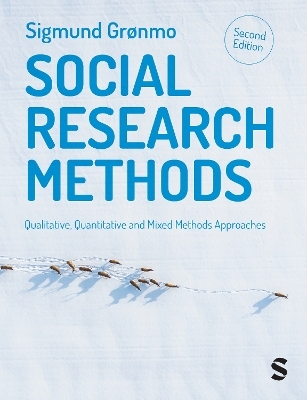
Social Research Methods
SAGE Publications Ltd (Verlag)
978-1-5296-1681-1 (ISBN)
Framing research as the process of asking and answering questions, this book demonstrates how to identify good research questions and how to structure and explore them successfully.
Whether you are just beginning your research journey or are a seasoned traveller, it helps you:
• Decide what you want to achieve with your research
• Know what options you have to explore your goals
• Navigate the nuances of different research approaches
• Understand the decisions of other researchers
• Choose what path best suits your project.
Through real-life examples demonstrating different types of research, the book introduces qualitative, quantitative, and mixed methods approaches so you can compare different methods at every stage of the research process, from initial idea and design to data collection and analysis.
This new edition includes new chapters on collecting and analysing mixed methods data, and additional content on qualitative data analysis. New examples reflect the cultural and global diversity of social research, and extra visual aids and summaries support understanding of key research concepts and stages.
The book is accompanied by an online teaching guide, including videos, additional case studies, annotated articles, and critical thinking exercises.
Sigmund Grønmo is Emeritus Professor of Sociology and former Rector (Vice-Chancellor) of the University of Bergen, Norway. He is affiliated with the Institute for Social Research, Oslo, Norway, and he is a Life Member of Clare Hall at the University of Cambridge, UK. Previously, he was Professor at the Norwegian Business School, Adjunct Professor at the University of Oslo, and Sámi University of Applied Sciences, as well as Research Director and Executive Director at the Norwegian Fund for Market and Distribution Research. He is an elected member of the Norwegian Academy of Science and Letters, and Academiae Europaea, as well as a Fellow of the World Academy of Art and Science. He has been a Visiting Professor at Dalhousie University, Halifax, Canada; Illinois State University, USA; University of California, Berkeley, USA; University of Queensland, Brisbane, Australia; James Cook University, Cairns, Australia; and University of Cambridge, UK. He has also been an Honorary University Professorial Fellow at Charles Darwin University, Darwin, Australia. He has published numerous books and a large number of journal articles, book chapters and papers, especially within economic sociology, the sociology of time, social network analysis, and social science methodology. He has extensive experience in teaching social research methods at universities and colleges in Norway and several other countries.
Part I Researching Society
Chapter 1 How and why we study society
Chapter 2 Methods and methodologies in social science
Chapter 3 The ethics and politics of research
Part II Designing Social Research
Chapter 4 Creating research questions
Chapter 5 Doing a literature review
Chapter 6 Choosing a research design
Chapter 7 Finding sources and data
Chapter 8 Sampling
Part III Data Collection and Data Quality
Chapter 9 Ethnography and participant observation
Chapter 10 Structured observation
Chapter 11 Unstructured interviews and focus groups
Chapter 12 Questionnaires and surveys
Chapter 13 Documentary sources and qualitative content analysis
Chapter 14 Quantitative content analysis
Chapter 15 Collecting qualitative and quantitative data: Comparisons and combinations
Chapter 16 Data quality, reliability and validity
Part IV Data Analysis
Chapter 17 Qualitative data analysis: Coding, categorization and concept development
Chapter 18 Qualitative data analysis: Typologies, hypotheses and holistic understanding
Chapter 19 Quantitative data analysis: Indexes and distributions
Chapter 20 Quantitative data analysis: Relationships between variables
Chapter 21 Generalizing empirical findings
Chapter 22 Analyzing qualitative and quantitative data: Comparisons and combinations
Part V Asking and Answering Questions in Social Science
Chapter 23 Description, explanation and understanding
Chapter 24 Time, space and level
Chapter 25 Relations, networks and structures
Chapter 26 Big data and computational social science
Part VI Writing and Presenting Research
Chapter 27 Working with data visualization
Chapter 28 Writing about research
| Erscheinungsdatum | 16.11.2023 |
|---|---|
| Verlagsort | London |
| Sprache | englisch |
| Maße | 189 x 246 mm |
| Gewicht | 1250 g |
| Themenwelt | Medizin / Pharmazie ► Allgemeines / Lexika |
| ISBN-10 | 1-5296-1681-6 / 1529616816 |
| ISBN-13 | 978-1-5296-1681-1 / 9781529616811 |
| Zustand | Neuware |
| Informationen gemäß Produktsicherheitsverordnung (GPSR) | |
| Haben Sie eine Frage zum Produkt? |
aus dem Bereich


